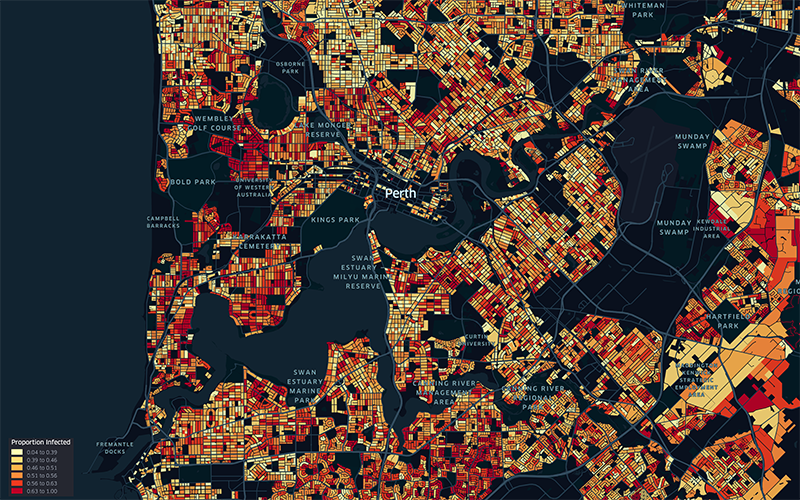Search


News & Events
Sophisticated new modelling suggests keeping mask mandate could prevent 147,000 COVID-19 casesWA’s current Omicron COVID-19 outbreak could jump by 147,000 cases if mask mandates are abandoned before the Easter long weekend, according to sophisticated new modelling.

News & Events
New study identifies African ‘hotspot’ for highly infectious diseasesA regional corner of Africa is a hotspot for cases of HIV, tuberculosis and malaria, prompting researchers to call for targeted health support rather than a national response.
Research
Risk factors associated with post-tuberculosis sequelae: a systematic review and meta-analysisPost-tuberculosis (TB) sequelae present a significant challenge in the management of TB survivors, often leading to persistent health issues even after successful treatment. Identifying risk factors associated with post-TB sequelae is important for improving outcomes and quality of life of TB survivors. This systematic review and meta-analysis aims to identify risk factors associated with long-term physical sequelae among TB survivors.
Research
A global mathematical model of climatic suitability for Plasmodium falciparum malariaClimatic conditions are a key determinant of malaria transmission intensity, through their impacts on both the parasite and its mosquito vectors. Mathematical models relating climatic conditions to malaria transmission can be used to develop spatial maps of climatic suitability for malaria. These maps underpin efforts to quantify the distribution and burden of malaria in humans, enabling improved monitoring and control.
Research
A malaria seasonality dataset for sub-Saharan AfricaMalaria imposes a significant global health burden and remains a major cause of child mortality in sub-Saharan Africa. In many countries, malaria transmission varies seasonally. The use of seasonally-deployed interventions is expanding, and the effectiveness of these control measures hinges on quantitative and geographically-specific characterisations of malaria seasonality.
Research
WALLABY Pilot Survey: Public release of HI kinematic models for more than 100 galaxies from phase 1 of ASKAP pilot observationsWe present the Widefield ASKAP L-band Legacy All-sky Blind surveY (WALLABY) Pilot Phase I Hi kinematic models. This first data release consists of Hi observations of three fields in the direction of the Hydra and Norma clusters, and the NGC 4636 galaxy group.
Research
WALLABY pilot survey: Public release of H i data for almost 600 galaxies from phase 1 of ASKAP pilot observationsWe present WALLABY pilot data release 1, the first public release of H i pilot survey data from the Wide-field ASKAP L-band Legacy All-sky Blind Survey (WALLABY) on the Australian Square Kilometre Array Pathfinder.
Research
Built Environments And Child Health in WalEs and AuStralia (BEACHES): a study protocolChildhood obesity and physical inactivity are two of the most significant modifiable risk factors for the prevention of non-communicable diseases. Yet, a third of children in Wales and Australia are overweight or obese, and only 20% of UK and Australian children are sufficiently active.
Research
Spatial codistribution of HIV, tuberculosis and malaria in EthiopiaHIV, tuberculosis (TB) and malaria are the three most important infectious diseases in Ethiopia, and sub-Saharan Africa. Understanding the spatial codistribution of these diseases is critical for designing geographically targeted and integrated disease control programmes. This study investigated the spatial overlap and drivers of HIV, TB and malaria prevalence in Ethiopia.
